The Union Public Service Commission (UPSC) examination is a gateway to prestigious civil service positions in India. Aspiring civil servants undergo rigorous
preparation to crack this challenging exam. The UPSC exam is a defining moment for candidates aiming to serve the nation. It assesses not only knowledge but
also analytical skills, decision-making abilities, and ethical values, the exam comprises three stages; Preliminary Examination (CSAT) which Tests general aptitude
and knowledge. Stage 2 is Main Examination; includes essay writing, general studies, and optional subjects and last stage interview (Personality Test); Evaluates personality
traits and suitability for administrative roles. UPSC has also mentioned some eligibility criteria for the UPSC exam as following:
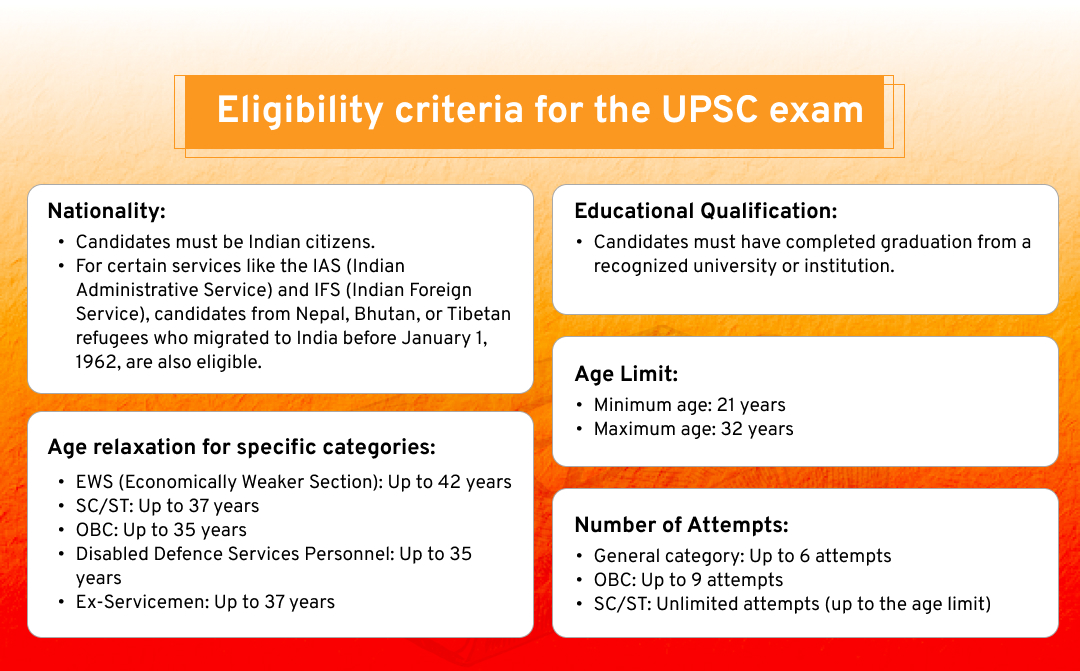
Pre Preparation Stage:
- Go through syllabus: meticulous understanding of the UPSC syllabus is pivotal for effective preparation. It streamlines efforts, enhances focus, and boosts
success chances in this rigorous and competitive examination. By adhering closely to the syllabus, aspirants can strategically allocate time and resources, ensuring
comprehensive coverage of relevant topics and effectively Prepare for UPSC.
- Go through PYQs: Solving UPSC previous year question papers is crucial for effective preparation of UPSC. It provides insights into exam patterns, priority areas,
and time management. Self-assessment through mistakes helps determine strategies, strengths, and weaknesses. Practicing PYQs ensures thorough revision and boosts confidence
for cracking the Civil Services Exam.
- Make list of Important Topics: to prepare for UPSC effectively make a list of topics that are most repeated in PYQs and important topics form the points of view of exam.
Also try to arrange it in a subject-wise manner so it becomes easy for you to study.
- Make Your Book list: it is important what resources you choose for your preparation for UPSC and sticking to one resource is very important because different sources can
create confusions regarding topics.
- Start reading newspapers: Reading newspapers is an unavoidable aspect of UPSC preparation. Newspapers are important source to the current affairs, general knowledge,
analytical thinking, and government policies.
- Divide your syllabus in three parts for UPSC preparation in 6 months.
- a) Part-I: 33% of prelims and GS-I and GS-II for mains + current affairs+ answer Writing
- b) Part-II: 33% of prelims and GS-III and GS-IV for mains + current affairs+ answer Writing
- c) Part-III: 33% of prelims and Essay, compulsory and Optional Papers for mains. + Current affairs + answer Writing
- Make your time table according to your day and Start your preparation for UPSC.
- Go through NCERTs as well.
| Month |
To cover |
| First |
Part-I: 33% of prelims and GS-I and GS-II for mains + current affairs+ answer Writing |
| Second |
Part-II: 33% of prelims and GS-III and GS-IV for mains + current affairs+ answer Writing |
| Third |
Part-III: 33% of prelims and Essay, compulsory and Optional Papers for mains. + Current affairs + answer Writing |
| Fourth |
First 20 days: topics that you missed + current affairs + answer Writing
Rest of the month: revision + answer Writing + current affairs.
|
| Fifth |
Revision + current affairs+ answer writing + CSAT |
| Sixth |
Revision with focus on prelims + Mock Tests + current affairs. |
Strategy for Prelims Exam
Preparing for the UPSC Civil Services Preliminary Examination (Prelims) requires a focused
and systematic approach. Here’s a concise strategy to help you ace the Prelims and clear exam in 6 months:
Analyse the Syllabus Thoroughly:
- Begin by understanding the Prelims syllabus in detail.
- Identify key topics and subtopics for both General Studies Paper-I (GS-I) and CSAT (Paper-II).
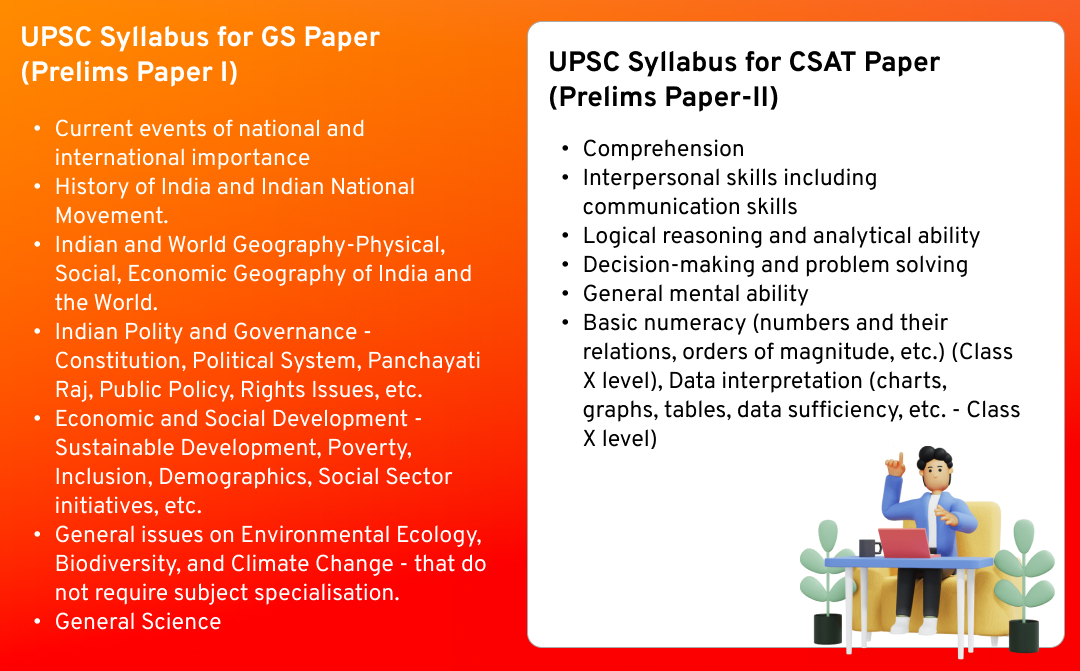
Analyse Previous Year Questions (PYQs):
- Study previous years’ questions to identify trends and recurring themes.
- Focus on areas that have a high probability of appearing in the exam.
Prepare an Effective Study Plan:
- Devise a time-bound study plan covering all subjects.
- Allocate sufficient time as per weightage for each topic.
Focus on Conceptual Clarity:
- Understand fundamental concepts thoroughly.
- Use NCERT books and standard texts for building a strong foundation.
Special Strategy for Current Affairs:
- Current affairs play a crucial role in Prelims.
- Follow reliable sources for daily news updates and focus on UPSC-relevant topics.
Don’t Neglect the CSAT Paper:
- While GS-I is crucial, don’t overlook the CSAT (Paper-II).
- Practice comprehension, reasoning, and quantitative aptitude regularly.
Revision is the Key:
- Regularly revise what you’ve studied.
- Create concise notes for quick revision.
Revision is the Key:
- Take mock tests to evaluate your preparation.
- Create concise notes for quick revision.
Strategy for GS-I Mains Exam
Preparing for UPSC General Studies Paper-I (GS-I) in the UPSC Mains requires a focused approach. Here’s a concise strategy
to tackle this paper effectively and this strategy will help you clear exam in 6 months:
Understand the Syllabus:
- Begin by thoroughly understanding the GS-I syllabus. Identify the key topics and subtopics.
- GS-I covers subjects like History, Art and Culture, Geography, and Indian Society.
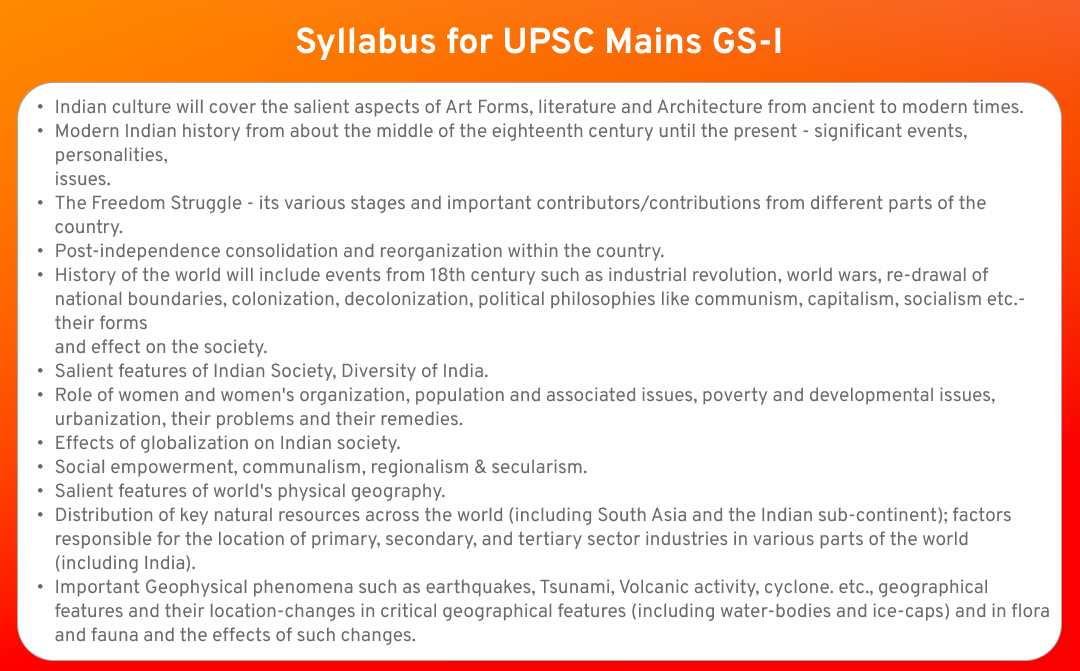
Focus Areas in GS-I:
- History: Study ancient, medieval, modern, and world history. Pay attention to important movements and personalities.
- Art and Culture: Explore classical dances, temple architecture, ancient literature, and musical instruments.
- Geography: Cover physical geography of India and the world, as well as human geography.
- Indian Society: Understand demography, social issues, and developments.
Conceptual Clarity:
- Build a strong conceptual foundation. Use NCERT books and standard texts.
- Connect static syllabus with current affairs where necessary.
Trend Analysis:
- Analyse previous years’ questions to identify trends.
- Focus on areas that consistently appear in the question papers.
Answer Writing Practice:
- Regularly practice writing answers. Work on clarity, structure, and coherence.
- Include relevant examples and illustrations.
Current Affairs Integration:
- Relate static topics to current events. Understand their implications.
- Stay updated with relevant news and issues.
Strategy for GS-II Mains Exam
Preparing for UPSC General Studies Paper-II (GS-II) in the UPSC Mains also requires a focused approach. Here’s a concise
strategy to tackle this paper effectively and this strategy will help you clear exam in 6 months:
Understand the Syllabus:
- Begin by thoroughly understanding the GS-II syllabus. Identify the key topics and subtopics.
- GS-II covers subjects like Governance, Constitution, Polity, Social Justice, and International Relations.
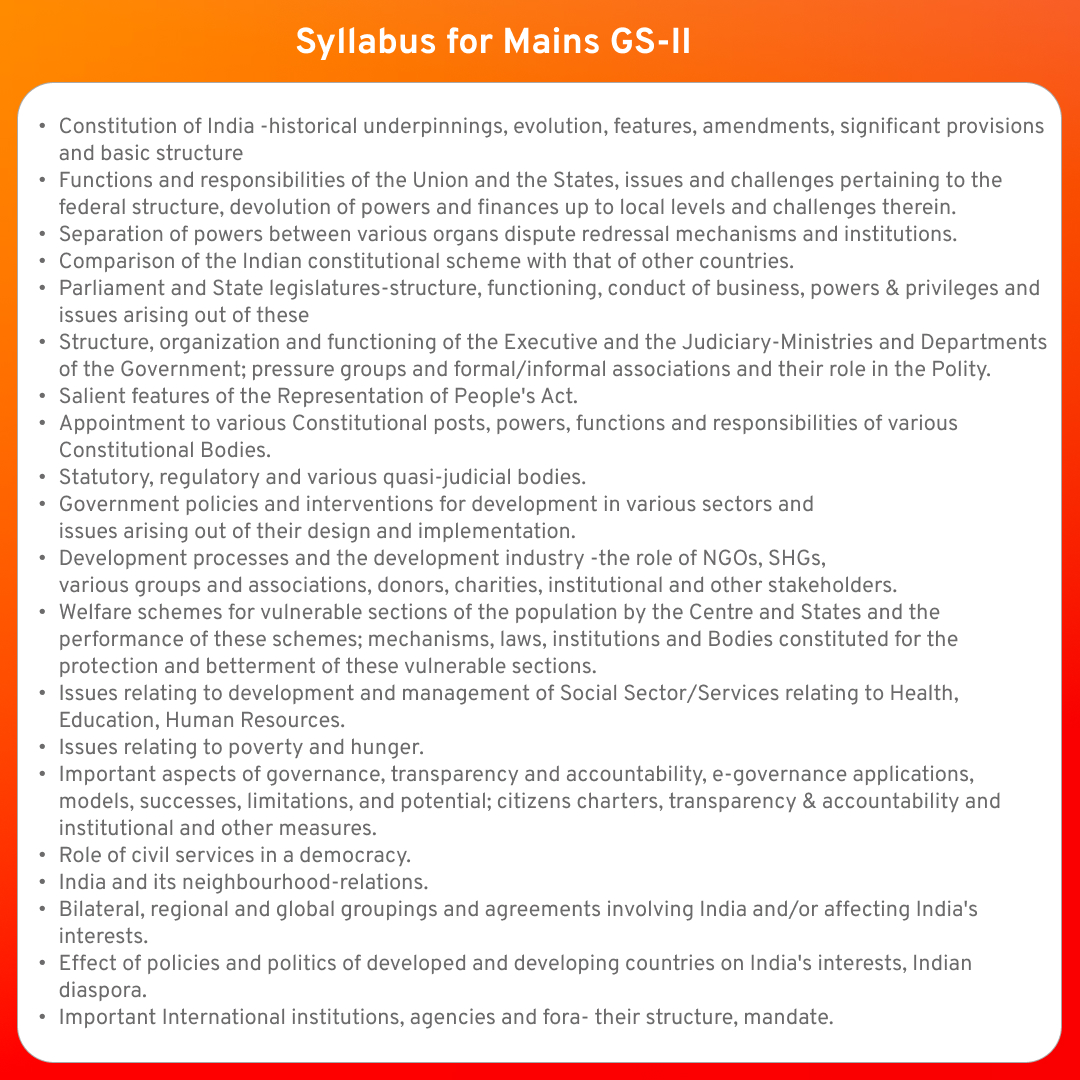
Focus Areas in GS-II:
- Polity and Constitution: Study features of the Indian Constitution, amendments, provisions, and constitutional bodies.
- Governance: Understand government policies, interventions, transparency, accountability, and e-governance applications.
- Social Justice: Explore issues related to the development and management of social sector/services, poverty, and hunger.
- International Relations: Cover bilateral and global groupings, agreements involving India, and regional relations.
Conceptual Clarity:
- Build a strong conceptual foundation. Use ‘Indian Polity’ by Laxmikanth (read it at least three times) and Class 11 NCERT – ‘Indian Constitution at Work’.
- Critical thinking is essential for answering interrelated topics.
Conceptual Clarity:
- Build a strong conceptual foundation. Use ‘Indian Polity’ by Laxmikanth (read it at least three times) and Class 11 NCERT – ‘Indian
Constitution at Work’.
- Critical thinking is essential for answering interrelated topics.
Current Affairs Integration:
- Relate static topics to current events. Understand their implications.
- Regularly read newspapers, especially ‘The Hindu’.
Answer Writing Practice:
- Practice writing answers with clarity, structure, and coherence.
- Include relevant examples from Economic Survey, 2nd ARC, or NITI Aayog’s 3YAA.
Strategy for GS-III Mains Exam
Preparing for UPSC General Studies Paper-III (GS-III) in the UPSC Mains demands a strategic approach. Here’s a concise strategy to tackle
this paper effectively, this strategy will help you clear exam in 6 months:
Understand the Syllabus:
- Begin by thoroughly understanding the GS-IV syllabus. Identify key topics and subtopics.
- GS-IV covers subjects like Ethics, Integrity, and Aptitude.
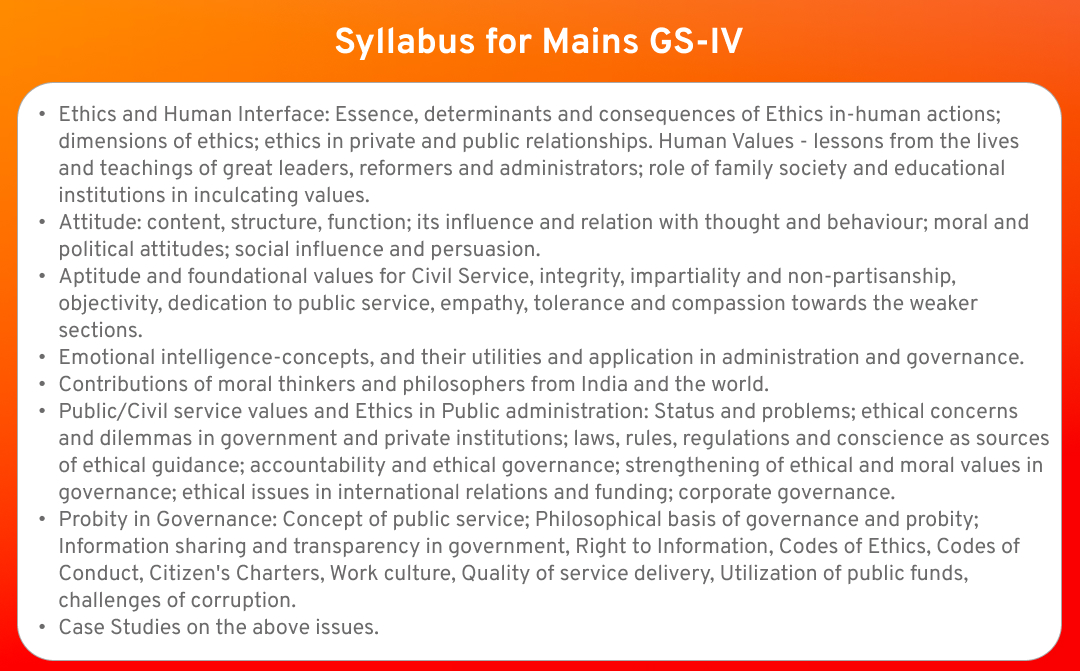
Focus Areas in GS-IV:
Ethics and Integrity:
- Study ethical theories, moral values, and principles.
- Understand concepts like honesty, integrity, and transparency.
Governance and Emotional Intelligence:
- Explore topics related to public service values, emotional intelligence, and ethical dilemmas.
- Analyse case studies to apply ethical principles.
Answer Writing Practice:
a. Structured Approach:
- Begin answers with a brief introduction.
- Go through some real-life examples or case studies.
- Conclude with a balanced view or recommendation.
b. Practice Case Studies:
- Regularly solve case studies to improve analytical skills.
- Apply ethical theories to practical scenarios.
Current Affairs Integration:
- Relate static topics to current events.
- Understand how ethical dilemmas play out in real-world situations.
Emotional Intelligence:
- Understand emotional intelligence concepts like self-awareness, empathy, and social skills.
- Relate emotional intelligence to effective decision-making.
Revision and Mock Tests:
a. Consolidate Notes:
- Make concise notes for each topic.
- Revise regularly to retain information.
b. Mock Tests:
- Practice writing answers within the word and limit.
- Evaluate your performance and identify areas for improvement.
Strategy for Optional Exam
Preparing for UPSC optional subject is a crucial decision. Here’s a concise strategy to help you prepare effectively, this strategy will help you clear exam in 6 months:
Choose Wisely:
- Evaluate Your Background: Consider your academic background, interests, and strengths.
- Prior Knowledge: Opt for a subject you’re genuinely interested in and have some prior knowledge or aptitude for.
- Syllabus Review: of the different optional subjects in UPSC.
Scoring Potential:
- Research Success Rates: Look into the success rates of different optional subjects in previous UPSC exams.
- Ample Study Materials: Ensure there are ample study materials, books, and resources available for your chosen subject.
Consistent Effort:
- Regular Practice: Consistency is key. Regularly practice solving questions related to your optional subject.
- Mock Tests: Take mock tests to simulate the exam environment and assess your performance.
Strategy for Essay Writing
Essay writing is a crucial component of the UPSC Civil Services Examination. Here’s a concise strategy to help you excel in essay writing and help you clear exam in 6 months:
Understand the Essay Format:
- An essay consists of mainly three parts as: an introduction, body paragraphs, and a conclusion.
- The introduction should be engaging, perhaps with a relatable quote or an event.
- The body paragraphs contain the core content, facts, and arguments related to the topic.
- The conclusion summarizes your viewpoint and leaves a lasting impression.
Choose Your Content Wisely:
- Read the Topic Carefully: Understand the essay prompt thoroughly.
- Recall Relevant Points: Spend around 30 minutes brainstorming and recalling points related to the topic.
Structure Your Essay:
- Divide your essay into paragraphs:
- Narrative Paragraph: Start with a descriptive narrative to introduce the topic.
- Supportive Paragraph: Present positive facts or ideas related to the topic.
- Critical Paragraph: Critique or analyse the topic (can be placed last).
Effective Introduction:
- Begin with a captivating opening line.
- Set the tone for the essay and grab the examiner’s attention.
Develop the Content:
- Substantiate Your Arguments: Back up your viewpoints with substantial reasons, examples, and data.
- Relate to Historical Context: Provide a historical perspective if relevant.
Language and Expression:
- Use good vocabulary and maintain coherence.
- Don’t make it complex and avoid unnecessary jargon.
Practice Regularly:
- Write essays on diverse topics.
- Time yourself to simulate exam conditions.